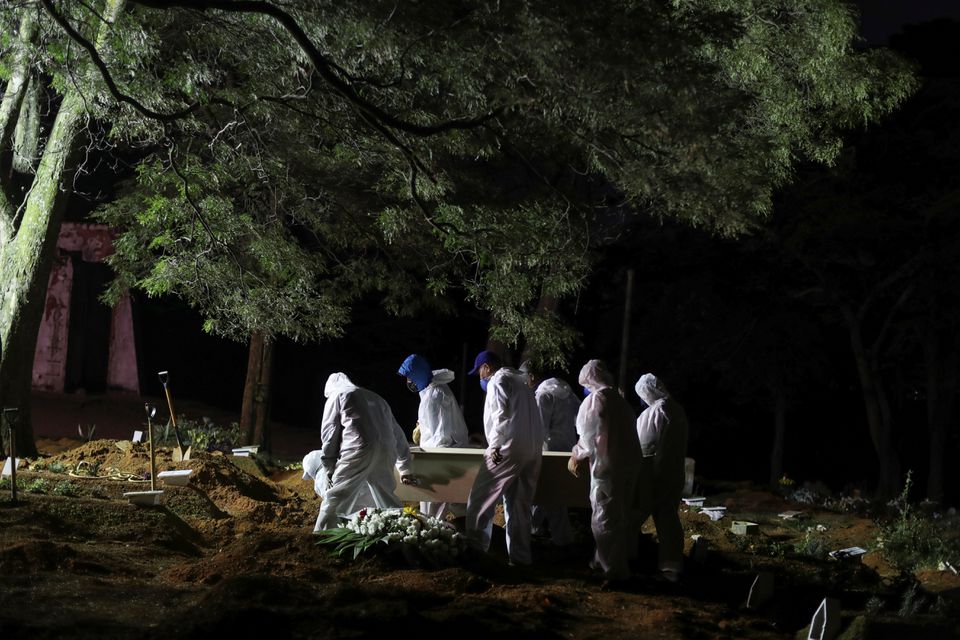
Gravediggers wearing protective suits carry a coffin as spotlights illuminate the graves during a night burial at Vila Formosa cemetery, amid the COVID-19 pandemic, in Sao Paulo, Brazil, April 28, 2021. /Reuters
Gravediggers wearing protective suits carry a coffin as spotlights illuminate the graves during a night burial at Vila Formosa cemetery, amid the COVID-19 pandemic, in Sao Paulo, Brazil, April 28, 2021. /Reuters
Brazil's death toll from COVID-19 surpassed 500,000 on Saturday, the country's health minister said, the worst official death toll in the world trailing only the United States.
Experts warn that the situation may even worsen due to delayed vaccinations and the government's refusal to back social distancing measures.
Only 11 percent of Brazilians have been fully vaccinated and epidemiologists warn that, with winter arriving in the southern hemisphere and new variants of the coronavirus circulating, deaths will continue to mount even if immunizations gain steam.
Brazil has registered 500,800 deaths from 17,883,750 confirmed COVID-19 cases, according to health ministry data on Saturday. Over the past week, Brazil has averaged 2,000 deaths per day.
The pandemic continues to devastate countries around the region with the Pan American Health Organization (PAHO) reporting 1.1 million new confirmed COVID-19 cases and 31,000 deaths in the Americas last week. PAHO noted upticks in six Mexican states, Belize, Guatemala, Panama and some places in the Caribbean.
PAHO warned that Colombia's COVID-19 situation is at its worst point yet, with intensive care unit beds filled in major cities.
Experts see the toll in Brazil, already the highest in Latin America, climbing far higher.
"I think we are going to reach 700,000 or 800,000 deaths before we get to see the effects of vaccination," said Gonzalo Vecina, former head of Brazilian health regulator Anvisa, predicting a near-term acceleration in fatalities.
Brazil is experiencing the arrival of these new variants and the Delta variant, first identified in India, will send the country for a loop, Vecina added.

Graves of people who passed away due to the coronavirus disease are pictured at the Parque Taruma cemetery in Manaus, Brazil May 20, 2021. /Reuters
Graves of people who passed away due to the coronavirus disease are pictured at the Parque Taruma cemetery in Manaus, Brazil May 20, 2021. /Reuters
Vecina criticized the country's President Jair Bolsonaro's handling of the pandemic, including the lack of a coordinated national response and his skepticism toward vaccines, lockdowns and mask-wearing requirements, which he has sought to loosen.
Thousands of Brazilians protested against Bolsonaro's management of the pandemic in nationwide demonstrations on Saturday, blaming the administration for the high death toll.
Raphael Guimaraes, a researcher at Brazilian biomedical center Fiocruz, said delays in the vaccination program in Latin America's most populous nation meant its full effects would not be felt until September or later.
Guimaraes warned that Brazil could revisit scenes from the worst of its March-April peak, when the country averaged 3,000 deaths per day.
"We are still in an extremely critical situation, with very high transmission rates and hospital bed occupancy that is still critical in many places," he said.
This week, new confirmed cases in Brazil accelerated to more than 70,000 per day on average, edging past India for the most in the world.
Vaccination will be crucial in beating the virus in Brazil, since the country has failed to reach a consensus on social distancing and masks, said Ester Sabino, an epidemiologist at the University of Sao Paulo.
"We really need to increase vaccination very quickly," she said.
As of Sunday morning, the number of confirmed COVID-19 cases worldwide has surpassed 178 million, with more than 3.8 million deaths, according to the latest data from Johns Hopkins University.
Officials of the World Health Organization said on Friday that some 30 to 40 countries are unable to provide second doses of COVID-19 vaccines to their populations, especially those expecting vaccines from AstraZeneca.
(With input from Reuters)

